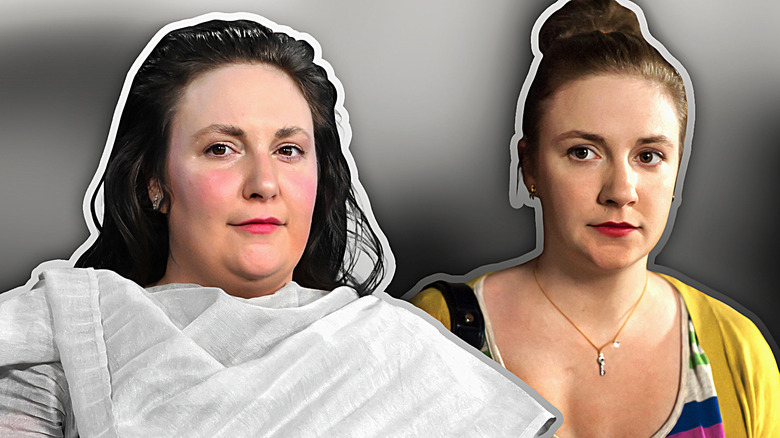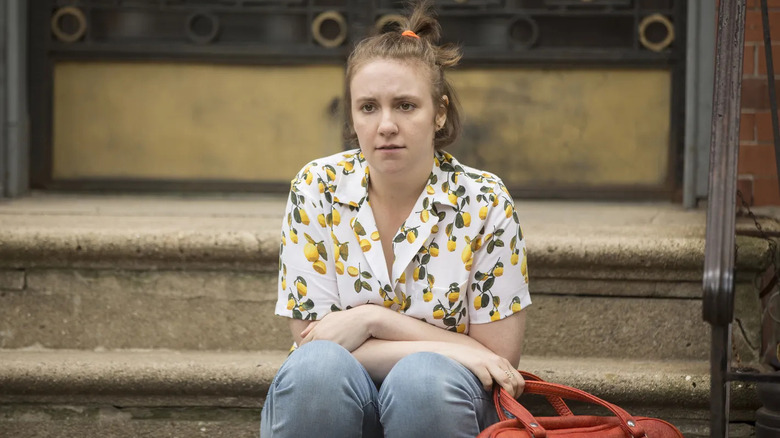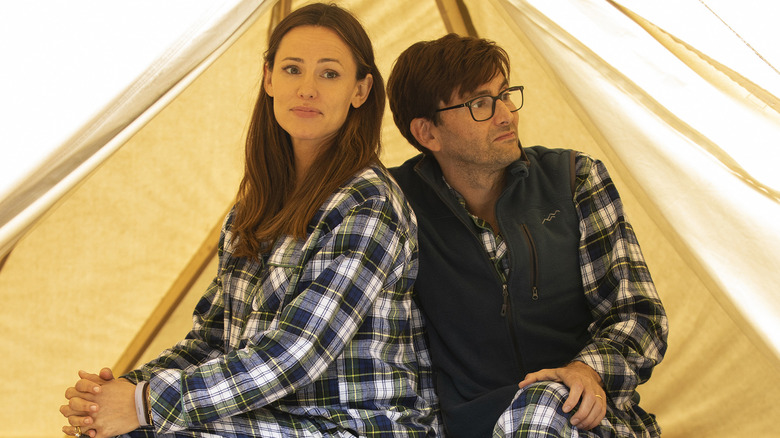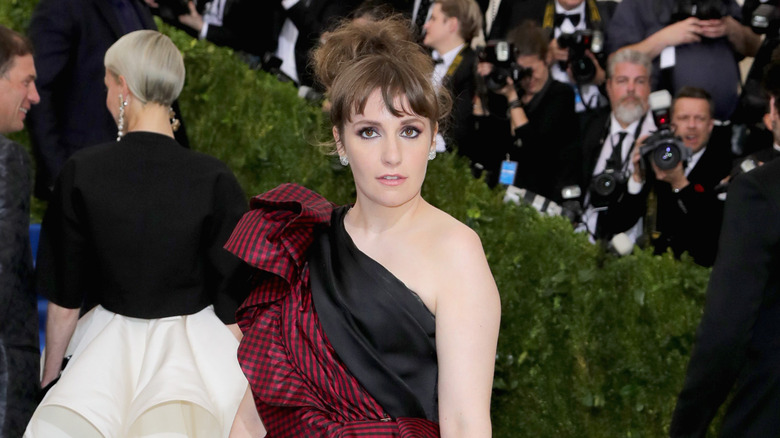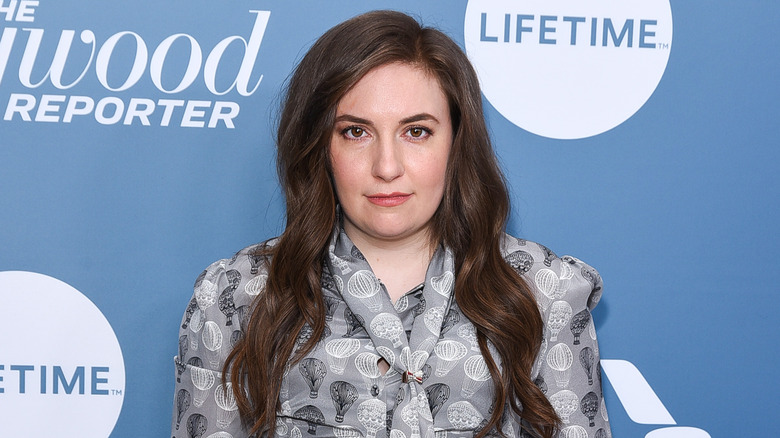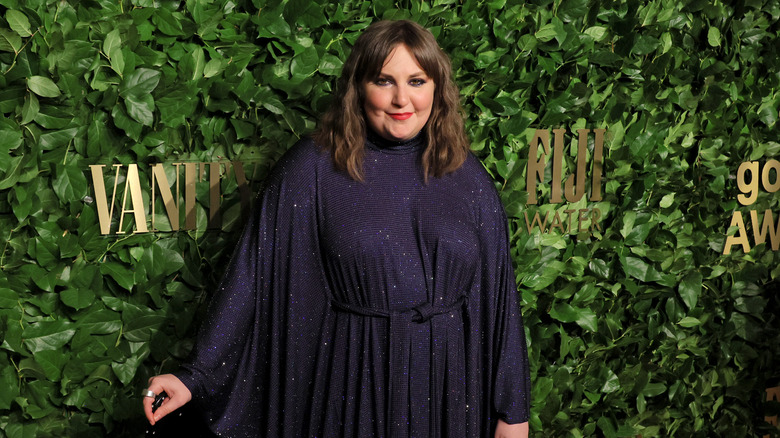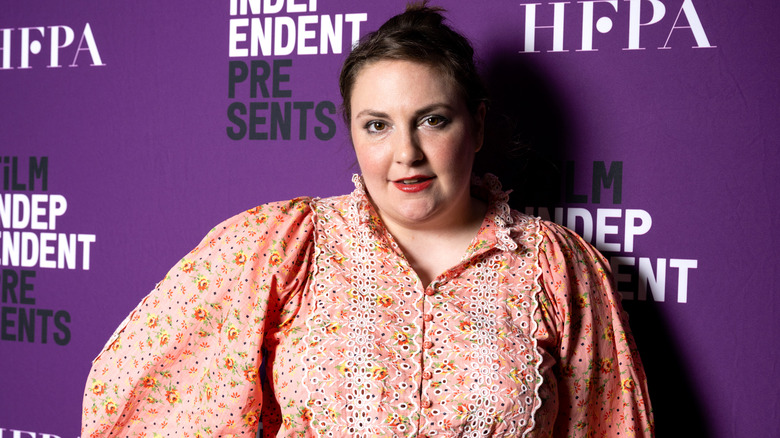What Happened To Lena Dunham After Girls - The Tragic Fall Of A Rising Star
This article contains discussions of sexual abuse, mental health, addiction, and chronic illness.
After the popular yet divisive HBO series "Girls" ended in 2017, star Lena Dunham — who served as a lightning rod for controversy ever since the show kicked off in 2012 — seemed to leave the spotlight. It's perfectly understandable that Dunham, who created, starred in, and wrote "Girls," needed a breather from both the bad-faith critiques of her body to the fair criticisms of some of her stranger comments. In the years since "Girls" concluded, leaving Dunham's antihero Hannah Horvath as a new mother, Dunham has worked on a few projects and shared updates about her life from time to time — but she's certainly not as omnipresent as she was while the series was on the air.
So what has Dunham been doing since she starred in a series that constantly made headlines for its casting, its storylines, and the way it told the story of millennial women living in New York? Here's an overview of her controversies, her life updates, and the work she's been doing since she brought "Girls" into the world.
Girls put Lena Dunham on the map
First, let's briefly refresh ourselves on "Girls" — and why it caused controversy in the first place. From the very first episode — where Hannah tells her aggrieved parents, "I think that I may be the voice of my generation. Or at least a voice. Of a generation" — the show was criticized for how unlikable the characters could be, especially Lena Dunham's Hannah. Dunham, as the show's lead, was flanked by Allison Williams, Zosia Mamet, and Jemima Kirke, and all of them were also criticized for being "nepo babies" (both Mamet and Williams come from established industry families, while Kirke's father is a musician and Dunham's mother is an artist). "Girls" also featured a ton of nudity and explicit sex scenes, usually featuring Dunham, whose plus-size body drew critiques from bad-faith actors who simply didn't want to see a realistic woman's curves on-screen. (Not for nothing, the show also introduced Adam Driver to both Hollywood and the world at large.)
For what it's worth, "Girls" — and by extension, Dunham — always knew exactly what it was doing. Characters like Williams' Marnie Michaels, one of the most odious yet earnest villains in television history, were never meant to be "likable" or even necessarily realistic. Still, Dunham got constantly raked over the coals by critics despite the show being a legitimate success — and one that's been consistently re-evaluated in the years since it premiered. So what did she do after "Girls?"
After Girls, Dunham's sophomore show didn't perform very well
If you forgot about Lena Dunham's second series, that makes sense; it was nowhere near as successful as "Girls." The series in question, "Camping," focuses on married couple Walt and Kathryn — played by David Tennant and Jennifer Garner — who are celebrating Walt's birthday, a responsibility Kathryn undertakes with arguably obsessive force, culminating in a disastrous camping journey (hence the title). So how did the show go over with critics? Not particularly well.
On Rotten Tomatoes, the 2018 show has a rating of just 28%, with a critical consensus that reads thusly: "The first season of 'Camping' makes it difficult to determine who the least happy campers are: those on the screen or those watching it." It ultimately only ran for one season, which probably provided fodder to Dunham's most fervent detractors — but "Camping" failing didn't cause a ton of controversy in and of itself. Dunham, who is outspoken (an understatement), manages to cause that all on her own.
Lena Dunham sometimes causes controversy with offhand comments
It's impossible to discuss Lena Dunham's various controversies without mentioning her 2014 book "Not That Kind of Girl: A Young Woman Tells You What She's 'Learned.'" The collection of essays sparked its own drama thanks to a chapter in which Dunham detailed intimately touching her younger sister when they were both very young, an admission that many took as a confession that Dunham had abused her sister, particularly when coupled with a story about the sisters kissing. (Dunham has since both responded to and apologized for these stories.)
Since her book, Dunham has caused other controversies as well. In 2016, before "Girls" ended, she sat next to athlete Odell Beckham Jr. at the Met Gala and claimed that he ignored her because she didn't fit an ideal body type, later apologizing for her comments. Dunham also appeared on a podcast later that year and said that she wished she'd had an abortion so that she could understand women who have sought this reproductive care (she apologized). When actress Aurora Perrineau accused "Girls" writer Murray Miller of sexual assault, Dunham and her then-creative partner Jenni Konner defended Miller (and she ... later apologized, telling Perrineau she believed her story).
Throughout her life, she has struggled with chronic illness and addiction
While this doesn't fall under the umbrella of "controversies," it's important to note that Lena Dunham has suffered from numerous health and wellness issues — including ones with her mental health and addiction. In September of 2022, the creator revealed to The Guardian that thanks to her lifelong struggle with anxiety, she was struggling with an addiction to benzodiazepines, a class of drugs that contains pills like Klonopin. Dunham told the outlet that she went to rehab to help overcome her addiction, saying that it was an enormous help: "Now I always joke that I wish everybody could go to rehab." The outlet also notes that, since her own struggles, Dunham has helped financially support rehabilitation centers for women. In April of 2020, Dunham celebrated her sobriety publicly.
Before that, Dunham was always quite open about her health struggles. In 2018, she spoke to Vogue about having a hysterectomy at the age of 31 due to her dehabilitating endometriosis. A year later, she publicly discussed being diagnosed with Ehlers-Danlos syndrome, which affects a person's connective tissues and causes chronic pain, and during the height of the COVID-19 crisis, she experienced "severe" symptoms for several weeks.
A few of Lena Dunham's projects have courted their own controversies
It's not just Lena Dunham's comments that have caused controversy — some of her post-"Girls" projects have been scrutinized as well. In 2018, Dunham was tapped to write the screenplay for the adaptation of Melissa Fleming's 2014 book "A Hope More Powerful than the Sea," the real-life story of Syrian refugee Doaa Al Zamel who survived a shipwreck in 2014 that happened off the coast of Malta. The adaptation, which still hasn't materialized, was criticized by many for being helmed by Dunham, Steven Spielberg, and J.J. Abrams, who are not Syrian and who many felt couldn't accurately speak to the experience.
Dunham's 2022 film "Sharp Stick" also came under fire when activist Amy Gravino spoke out about the project, saying that Dunham and her team asked her to consult on the movie due to the fact that its main character Sarah Jo (Kristine Froseth) was on the autism spectrum. Dunham and the rest of the movie's creative team responded and said that Sarah Jo was not meant to represent a person on the autism spectrum, even though they did contact Gravino about working on the movie at one point.
These days, Dunham is still directing — and happily married
Aside from "Sharp Stick," which was met with middling reviews, Lena Dunham has also worked behind the camera on some other projects, including an adaptation of the beloved young adult novel "Catherine Called Birdy." That film, which is exclusive to Amazon Prime Video, earned Dunham her best reviews since "Girls," thanks in large part to a winning performance by the lead actor Bella Ramsey, best known for "The Last of Us."
Aside from that, Dunham has taken time to live her life, marrying musician Luis Felber in 2021. She's still active on her Instagram, but definitely seems to be slowing her creative output down quite a bit ... which, naturally, has led to fewer controversies in her life.
If you or anyone you know needs help with addiction issues, help is available. Visit the Substance Abuse and Mental Health Services Administration website or contact SAMHSA's National Helpline at 1-800-662-HELP (4357).
If you or someone you know needs help with mental health, please contact the Crisis Text Line by texting HOME to 741741, call the National Alliance on Mental Illness helpline at 1-800-950-NAMI (6264), or visit the National Institute of Mental Health website.
If you or anyone you know has been a victim of sexual assault, help is available. Visit the Rape, Abuse & Incest National Network website or contact RAINN's National Helpline at 1-800-656-HOPE (4673).
